- Home
- Richard Adams
The Day Gone By Page 34
The Day Gone By Read online
Page 34
That night, after dinner, I swaggered up the gang-plank and presented my pass to the two military police sitting behind their table in the waist. One of them checked the pass, ticked off my name on his nominal roll in the ledger and handed the pass back to me. I had gone a few yards when he called ‘Sir.’
‘Yes, Corporal,’ I said, turning back.
‘I wouldn’t wave that about too much, sir. Today’s passes are blue, you see.’
I found the other three already back in our cabin.
‘Ah,’ said Roy, ‘the Cape Town Harriers! ‘Had a good run?’
I told them. ‘And what happened to you?’
‘Why, we stayed put, of course,’ said Roy. ‘What d’you think?’
‘And did they call the police?’
‘Yes, they did.’
‘And what happened then?’
‘Well, the police asked “Have they been violent, or used bad language, or broken anything?” And these geezers said No, we hadn’t; and the police said “In that case, we’re not interested. They’ve committed no offence.” So we hung in there till about seven-thirty and then went off to breakfast.’
They must have been British, as opposed to Afrikaans police, I thought. However, Roy’s judgment had been proved right yet again, and I felt appropriately foolish.
A day or two later we all left the Nea Hellas and went into camp at a place called Retreat. We went on enjoying Cape Town for about a week or more, until we were required to embark once again, this time on the New Amsterdam.
The New Amsterdam, a Dutch ship still staffed by the Dutch, had, like the Nea Hellas, sailed to join the Allies when her country was attacked by Hitler. She was at this time one of the largest and most luxurious liners in the world. She had no escort from Cape Town to Suez: she sailed at 25 knots in irregular zig-zags (which were perfectly all right once you’d got used to them). We were very comfortable on board and nothing eventful occurred as we went north.
We came to Suez, and thence to the big base camp at Gineifa. We were still able to stick together - an almost incredible circumstance in the Army - and had a tent for four. We knew that our comradeship was bound to be nearly over: postings would be coming in for us almost any day now. We had already been hauled up, one by one, and quizzed about our past experience and any specialist knowledge we might possess. It had been noted - though for all practical purposes it was a mere technicality - that I had spent all my time as an officer in units which were supposed to be concerned with petrol, or P.O.L. (petrol, oil and lubricants), as the Army called it. In fact I had had no specialized experience of the storage and transport of petrol.
One little incident of this time has remained in my memory. One evening, in late twilight, the four of us were having a few drinks at a cafe on the shores of the Great Bitter Lake. It was late October. The El Alamein offensive had begun a day or two before; we knew something big was happening, but news was still confined - as far as we were concerned, anyway - to talk and rumour.
As we sat chatting in the almost gone light, we became aware of a living creature on the sand near-by. It was sandy grey. Its body was flattish, a disc about as big as the palm of a human hand. It had spindly legs about as long as human fingers (you could imitate it with your hand) on which it walked, or crawled, slowly, in a stilt-like manner. Since voyaging, many years later, to Morea in the Tahiti group (where they abound) I have decided that this was a species of land crab. They are nocturnal, and live in shallow holes in the sand, to which, under the impact of light, they retreat, scuttling, rather as cockroaches do. Roy Emberson, our imperturbable, self-possessed soldier of fortune, evinced an almost cringing horror of this crustacean, and moved hastily out of the way as it came on. To him it bodied forth an epitome of the whole nature of this vile, dirty, nauseating country (we’d all had intensive gyppy tummy - diarrhoea - on arrival, of course) and several hours later he was still saying ‘I wish I hadn’t seen it.’ We had yet to encounter centipedes (akrebah), scorpions and (I, at any rate) the biting flies of the Negeb Desert. I doubt whether land crabs can hurt you: I have never given them the opportunity.
One night, a chance-met acquaintance (and I’m going to name him: he deserves it) called Lieutenant G. W. Reid asked whether I could lend him a book or two to pass the time. I lent him my first editions of Auden’s Another Time and Louis MacNeice’s Plant and Phantom, and never saw them, or Reid, again. This cured me of lending books. ‘What, lending books at twenty-two, A clean upstanding chap like you? —’
The good Lord compensated me. One morning I wandered into the N.A.A.F.I and there came upon a dog-eared little stash of battered books, paperbacks and others, for lending to the troops. Browsing and furrocking, I picked up a dingy, smallish volume, bound in what had once been light-blue. It was Emma.
I had never read Emma; or any of them, for that matter. It was like a revelation. I was glued to it a few hours later, when my posting came through. I was to report to Pal. Base in Jerusalem. In those days Jerusalem was in Palestine, a British-controlled country. It didn’t much matter to me where I was posted, as long as I could go on reading Emma. I felt sure the N.A.A.F.I. wouldn’t miss it, so I knocked it off. It anaesthetized me against the final breakup of the gang of four. Piggy’s posting had come through at the same time. We all said very English, casual good-byes to one another and went our ways. I can truly say that I little thought how those months of transit would remain in my memory locked for year after year. They had given me almost (though not quite, as I will relate) the best time I ever had in the army.
Chapter XVI
I boarded the north-bound train in vague preoccupation.
‘A bad thing! Do you really think it a bad thing? - why so? -’
‘I think they will neither of them do the other any good.’
‘You surprize me! Emma must do Harriet good:’
We came to Ismailiya and ran on along the length of the Suez Canal. We reached El Qantara on the border, where Arabs ran up and down the platform shouting ‘Eggiz, George! Eggiz an’ bread!’ ‘Money change your money!’
‘Oh! what a sweet house! - How very beautiful! - There are the yellow curtains that Miss Nash admires so much.’
On along the Mediterranean coast, on a railway which no longer exists; on to El Arish and Khan Yunis, all sand and white, chow-like, vagrant, ownerless pie-dogs, the kind that licked Lazarus’s sores, I expect.
‘Walk home! - you are prettily shod for walking home, I dare say. It will be bad enough for the horses.’
Gaza and points north. Never a stream to be seen along the narrow coastal strip. We came to Ramleh and Lydda, and here, for some forgotten reason, I got off the train and went up to Jerusalem by military lorry.
‘Human nature is so well disposed towards those who are in interesting situations, that a young person, who either marries or dies, is sure of being kindly spoken of.’
At Pal. Base, in the King David Hotel (blown up and destroyed by the Irgun Zvai Leumi in 1947) I presented my credentials and was posted to a Petrol Depot sited near the ruins of Ashkelon, on the Philistian Plain, not far from Gaza.
‘What’s Gaza like?’ I asked the orderly room sergeant.
‘Well, it’s like all these wog towns, you know, sir: couple of shit-bins and a camel.’
I spent the night in Jerusalem before travelling back south.
‘Oh! but indeed I would much rather have it only in one. Then, if you please, you shall send it all to Mrs Goddard’s - I do not know - No, I think, Miss Woodhouse, I may just as well have it sent to Hartfield -’
No. 2 Petrol Depot was, in effect, nowhere. It was a camp of Nissen huts and petrol stacks on the bare plain. It had a major O.C., a captain and three subalterns, of whom I was one.
The plain truth is that for the next year and more I did, in effect, nothing. For all military purposes I might just as well not have been there. To this day I do not know with any clarity what was the precise function of No. 2 Petrol Depot. It certainly was not to mainta
in a regular supply of petrol to the advancing 8th Army, for at that rate it would have been humming, and it was not. There was a branch railway line leading away to the main line (the one I had travelled up), but only about four or five times during the year I spent at Al-Jiyah (as the place was called) were we required to load a train with petrol cans for the desert.
Our petrol all came by pipeline from Iraq via two mysterious staging posts known as Mafraq and M4. Most of this Iraqi petrol went direct to Haifa, but it kept us topped up as well. We stored bulk petrol in tanks, though not very much of it; and this went out to local recipient units in Bedford tanker lorries - a regular but small business. And then there were the storage stacks, which was what the depot was really all about. At intervals on the face of the open plain had been dug about twenty shallow pits, each about half to a quarter of an acre in size. These were roofed over with corrugated iron and stacked with the standard four-gallon containers known as ‘flimsies’, filled some with petrol and some with diesel. They were flimsy, too. They were almost of the consistency of foil: you could easily dent them with your hand. And of course they were prone to leak. Inspecting for and removing ‘leakers’ was a continual chore: and only marginally worthwhile, too, it always seemed to me, for of course you could spot only the ones on top or on the edges of the stacks. If you have a stack of cans numbering twenty by twenty by ten high, you can conveniently inspect and get at only 780 out of the 4,200 - a few more on the top, perhaps, if you’re conscientious enough to tilt the outer ones and look in. The raison d’être of ‘flimsies’ – which were universal throughout the Middle East Force – was that they were cheap and disposable. (Beaten flat, they came in handy for all sorts of jobs - surfacing, patching, roofing and the like.) Throughout the year 1943, however, they became more and more widely recognized as wasteful and more trouble than they were worth, because they were so frangible in handling and spilt as you poured from them: also, in stacks, the lower ones tended to buckle under the weight of those on top. As the 8th Army advanced westward, they captured plenty of Jerricans, the stout, lid-locking, lipped-for-easy-pouring, grooved-for-firmer-stacking cans of the Germans. Soon the British were making them in imitation, and by the time the Normandy campaign opened in 1944 they were universal. (But by then I was no longer in petrol.)
‘The stacks’ required us - the R.A.S.C. personnel - to have along with us no fewer than three very different sorts of people. The first were the white, dog-handling military police. There were about eight of these, lance-corporals mostly, and there were two to each dog - Alsatians. The dogs, I was told, were trained by some civilian genius in Haifa. They were impressive; instantly obedient, coats sleek and shining, fangs gleaming. They had been trained to detest and try to seize any Arab who might come near. It was a sight to see one, with its masters, passing a group of home-going Arabs. It would become aggressive; bark, growl and slaver, up on its back paws, straining at the leash to get at them. On the other side of the road the Arabs would cower, sometimes actually crying out with fear, imploring and cringing in their terror. At night, at irregular hours, the dogs would make rounds of the stacks, and also of the spare tyre and tool store. They had names like Tex and Grab and Punch and Jock.
But these were not enough to keep the top brass at Pal. Base sleeping quietly in their beds at night. We also had a company - about 150 strong - of East African Pioneers, whose job was to stand sentry on the stacks by day and night. They had English officers: a gentle, rather ineffective but pleasant major, very much a civilian in uniform, who once showed me a photograph of a pretty, dark-haired girl who he said was a prostitute of his acquaintance in Alexandria. If I fancied he would give me her telephone number. Captain Rawlings, their 2 i/c, I came to like well. He was devoted to his men, obviously enjoyed his job and was becoming fluent in Swahili under the tuition of his interpreter, Corporal K’booy. (The black soldiers spoke no English and came from several different tribes, each with its own lingo. Swahili was their lingua franca.)
These East Africans, simple, ingenuous people straight from their villages, were mad keen on soldiering. Spit and polish was the breath of life to them; so was drill. They were proud to be serving Kingi Georgie. As you went among the stacks, they would give you a butt salute like a pistol shot, which could be heard four hundred yards away. Their audibility was not confined to butt salutes, either. It was an odd phenomenon. At night, widely dispersed among the solitudes of the stacks, they could converse with one another without raising their voices over considerable distances. Their voices were quiet, unexcited, resonant and very deep, with plenty of vowels, and for some reason carried further than any European’s: quite as far as the next sentry. I became used to the sound, low and intermittent; it came to form, for me, an integral part of the plain by night.
Thirdly, there were the Arab labourers. Their job was, quite simply, humping. They humped cans of petrol and diesel and drums of oil. It was astonishing how much humping there was to do, considering that we were not an operative depot committed to 8th Army’s desert campaign. There must have been something like six or seven hundred labourers all told, for I know it took me three hours to pay them their poor little weekly pittances; sweltering, with a nasty headache, under the corrugated-iron roof of an open-fronted shack, while they waited outside, squatting in the hot sun.
They were surely among the poorest men in the world. They had bare feet and awful teeth. They wore dirty head-turbans and filthy, ragged garments soaked in petrol, oil and diesel. Diesel is caustic, and I have more than once seen an Arab labourer’s back raw with diesel burns. No doubt they had some sort of better clothing at home, but they had no clean water or regular means of washing. They smelt more of diesel and petrol than of their own sweat and dirt. A large number always had suppurating, yellow-oozing eyes; not one of them, under medical inspection, would have been passed fit by European standards. They were not idle, for they worked in gangs of about twenty, each gang under a leader or rais, who was responsible for them. (I never learned how an Arab became a rais: they were usually men, to all appearances, of slightly better social standing, and cleaner, since they themselves did not labour, but only organized and ‘encouraged’.) At the top was the ‘boss rais’, a young Arab of about twenty-five, dressed in clean khaki shirt and shorts and able to speak English pretty fluently. His name was Ahmed Mohammed Mudhorn, but he was universally known as ‘Aussie’, having once been interpreter to an Australian unit temporarily in the locality. Aussie had a short way with protesters or complainants. He would put his hands on his hips, push his curly head forward and bellow, asking unanswerable questions, calling pejorative names and pouring out invective until the wretched victim, usually old enough to be his father, was dazed into acquiescence.
By gum!, though, those half-starved, poverty-stricken Arabs could work; and, amazingly, with a will. I have never forgotten one evening during the summer of 1943, when there was a train to be loaded which had to go up the desert that night. For sweltering hours they humped and loaded, while the red sun slowly sank towards the unseen Mediterranean and little nocturnal creatures, mice, crickets and the like, emerged, cautiously and at a distance, for the night’s activities. Corporal Goldie, a cheerful young Cockney, was in charge, standing tall on a rail truck, pointing here and there and commanding the raises in soldiers’ Arabic. ‘Ta’al hinnah’, (come here) ‘ ijjri’, (run) ‘staimah shwire’ (wait a bit) and so on. At last, in near darkness, the exhausting job was finished and the train driver began to get up steam. Then a funny thing happened. Spontaneously, the Arabs began to dance. Some plucked flowers and put them between their teeth, joining hands, singing and capering. El zarbed, the officer, (me) was drawn in and found himself hop, skip and jumping, taking each rais by the hand and twirling round. (It was not unlike some sort of English country dance, really: take hands, round and back, with everybody clapping and stamping.) The train steamed slowly out to cheering and cries of delight, pelted with flowers. It didn’t matter, then, who was the white officer
or who was the exhausted, impoverished Arab labourer. We just all knew we’d loaded the damned train and, most movingly, it stirred these simple men to genuine delight and self-congratulation.
They were all thieves, of course. Who’d blame them? But it is odd, and you never quite get used to it, to live in a society where literally everything, however worthless, is liable to be stolen. Once, we made a bit of a rifle range, out on the plain. All it had in the way of artifacts were some rough target-frames (flimsies again) mounted on sticks. They were stolen. For what, I wonder? In my billet, on the shelf, I had a Hohner chromatic mouth-organ in its box. The mouth-organ went, but the box was left as it was, so that I should be less likely to notice the theft at once and start enquiries. Also on that shelf was my army ‘emergency ration’. These were standard issue: everyone had one. They consisted of a block of horribly unpalatable chocolate mixed with meat extract, in a tin fastened at the side with a kind of clip. They were deliberately made unpalatable so that no one would want to eat one unless he were in extremis. Well, my emergency ration was removed from the tin and the empty tin left unsullied and unblemished: only when (and if) you picked it up did you realize that it was empty. I recall, too, having to sit on a court of enquiry into the theft - the brilliant theft - of a dozen heavy lorry tyres from a windowless, padlocked hut surrounded by a high barbed-wire fence. No one man could have carried one of those tyres alone; that’s how heavy they were; and the wire wasn’t even cut.

 Watership Down
Watership Down Tales From Watership Down
Tales From Watership Down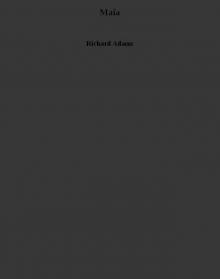 Maia
Maia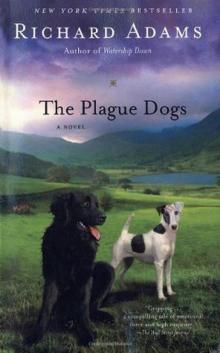 The Plague Dogs
The Plague Dogs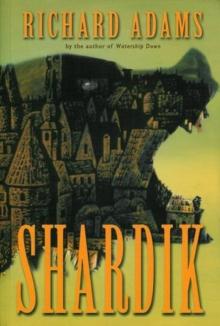 Shardik
Shardik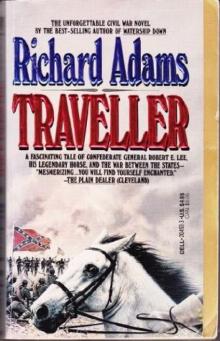 Traveller
Traveller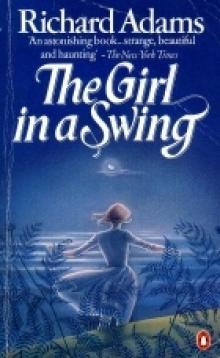 The Girl in a Swing
The Girl in a Swing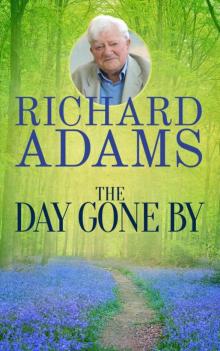 The Day Gone By
The Day Gone By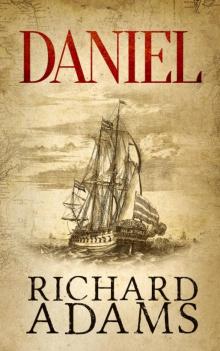 Daniel
Daniel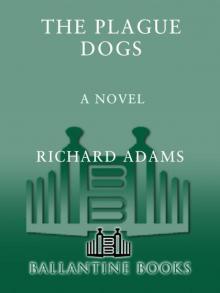 The Plague Dogs: A Novel
The Plague Dogs: A Novel